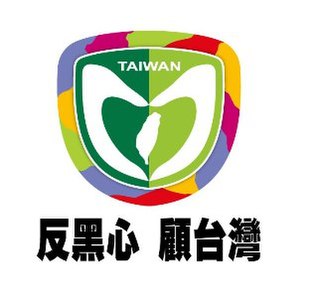 W
WThe 228 Hand-in-Hand rally was a demonstration in the form of a human chain held in Taiwan on February 28, 2004, the 57th anniversary of the February 28 Incident. Approximately two million Taiwanese formed a 500-kilometer (310 mi) long human chain, from the harbor at Keelung, Taiwan's northernmost city, to its southern tip at Eluanbi, Pingtung County to commemorate the incident, to call for peace, and to protest the deployment of missiles by the People's Republic of China aimed at Taiwan along the mainland coast.
 W
WThe 517 Protest was a protest that took place on 17 May 2009 in Taipei and Kaohsiung, Taiwan. The event vented anger at President Ma Ying-jeou for China-friendly policies that were seen as compromising Taiwan's sovereignty.
 W
WThe 1025 demonstration(Chinese: 1025反黑心顧台灣大遊行; lit. 'October 25 Opposing Evil Minds and Looking out for Taiwan March') was a demonstration on 25 October 2008 sponsored by the Democratic Progressive Party (DPP) and Taiwan Solidarity Union in Taipei, Taiwan. This protest march was launched five months after the inauguration of President Ma Ying-jeou and was preceded by an earlier 30 August 2008 protest in August which focused on Ma's failing economic plans.
 W
WThe February 28 incident or the February 28 massacre, also known as the 228 incident, was an anti-government uprising in Taiwan that was violently suppressed by the Kuomintang-led Republic of China government, which killed thousands of civilians beginning on February 28, 1947. The number of Taiwanese deaths from the incident and massacre was estimated to be between 5,000 and 28,000. The massacre marked the beginning of the White Terror, in which tens of thousands of other Taiwanese went missing, died or were imprisoned. The incident is one of the most important events in Taiwan's modern history and was a critical impetus for the Taiwan independence movement.
 W
WThe Kaohsiung Incident, also known as the Formosa Incident, the Meilidao Incident, or the Formosa Magazine incident, was a crackdown on pro-democracy demonstrations that occurred in Kaohsiung, Taiwan, on 10 December 1979 during Taiwan's martial law period.
 W
WMillion Voices against Corruption, President Chen Must Go (百萬人民反貪腐倒扁運動) was a Taiwanese mass campaign led by former Chairman Shih Ming-teh of the Democratic Progressive Party to pressure the Taiwanese then President Chen Shui-bian to resign in 2006.
 W
WThe Tapani incident or Tapani uprising in 1915 was one of the biggest armed uprisings by Taiwanese Han and Aboriginals, including Taivoan, against Japanese rule in Taiwan. Alternative names used to refer to the incident include the Xilai Temple Incident after the Xilai Temple in Tainan, where the revolt began, and the Yu Qingfang Incident after the leader Yu Qingfang.